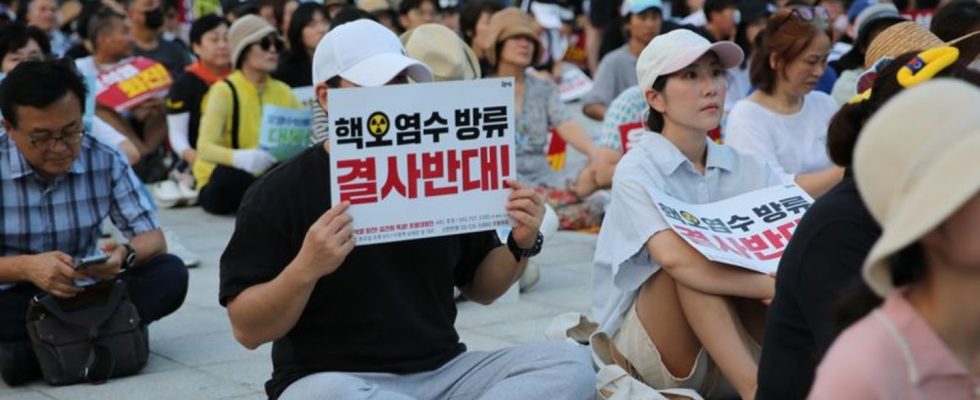nuclear accidents
Fukushima cooling water: tensions between Japan and China
In Busan, South Korea, people are also demonstrating against the start of discharge of treated cooling water from the Fukushima nuclear ruins into the sea. photo
© Lu Rui/XinHua/dpa
China has previously protested against this: for days, the operators of the nuclear power plant that crashed in Fukushima have been dumping radioactive water into the sea. Anti-Japanese sentiment is rising in China.
Because of the discharge of cooling water from the Japanese nuclear reactor Fukushima into the sea, relations between the government in Tokyo and China still tense. Japan summoned the Chinese ambassador and asked Beijing to ensure that its own population dealt with the issue “calmly”. In addition, Beijing should ensure the safety of Japanese citizens and facilities in the neighboring country, as reported by the Japanese media on Monday.
Anti-Japanese sentiment is growing in China because Japan has been dumping filtered and diluted cooling water into the sea since Thursday. Among other things, there are calls to boycott Japanese products and to cancel trips to Japan. Japanese companies such as restaurants, cultural institutions and even medical facilities have been bombarded with protest calls from China for days, so that their operations are massively disrupted.
The Japanese Ministry of Foreign Affairs called on its own citizens who want to travel to or stay in China to be careful. You shouldn’t speak out loud in Japanese in public spaces, the Japanese news agency Kyodo reported.
1.34 million tons of cooling water
In March 2011, several core meltdowns occurred in the Fukushima Daiichi nuclear power plant as a result of a severe earthquake and massive tsunami. Since then, the destroyed reactors have had to be cooled with water, which is collected in more than 1,000 tanks – around 1.34 million tons of cooling water have now collected there.
Before being discharged into the sea, the cooling water is filtered, except for the radioactive isotope tritium. The operating company Tepco therefore dilutes the water with seawater to such an extent that the tritium concentration drops to 1500 becquerels per liter, which corresponds to less than a fortieth of the national safety standard. According to the Japanese government, the radiation levels of the first seawater samples taken by the Ministry of Environment since the discharge were even below the detectable limits.
Nevertheless, China describes the water as “nuclear contaminated” and imposed an import ban on all fishery products from Japan. Experts point out that China itself routinely discharges cooling water from its own nuclear power plants into the sea, with radiation levels many times higher than in the case of the Fukushima cooling water.

